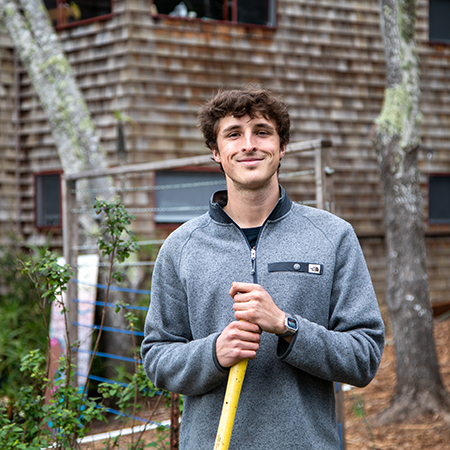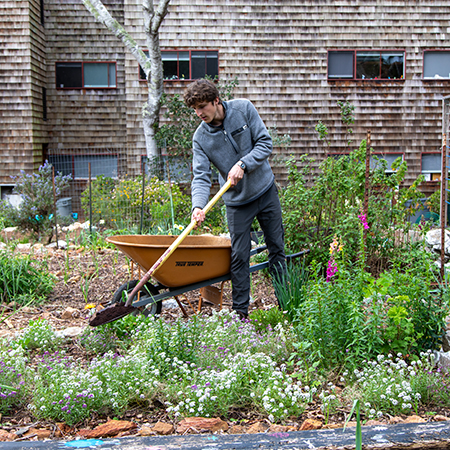Campus News
Student leads innovative campus composting initiative for sustainable waste management
UCSC student Gabriel Schiering, supported by Earth’s Future Institute’s Frontier Fellows program, leads the innovative Oakes Community Composting Project, demonstrating a model for decentralized composting systems on campus.


Gabriel Schiering (Oakes ’24, business management economics) decided to attend UC Santa Cruz for a variety of reasons. He was drawn to the university for its reputation for environmental justice and sustainable innovation, and its unparalleled campus beauty. Now in his final year of undergraduate education, Schiering is leading the Oakes Community Composting Project in collaboration with the Oakes College Garden to optimize the model of a local, multi-source food waste composting system.
The project aims to promote decentralized composting systems as an answer to the problems with organic waste management. By collecting residential food waste and composting it on campus in a student-run garden, Schiering and his team are creating a model in cheap and circular waste management that informs the transformation of conventional organic waste programs at UCSC and elsewhere. Schiering says that the student-run, on-campus nature of this project allows the team to facilitate educational events and interdisciplinary outreach.
Schiering was able to bring the Oakes Community Composting Project to its fullest potential with the support of Earth’s Future Institute’s Frontier Fellows program.
Piloted in spring 2022 by Astrophysics and Astronomy Professor Emerita Sandra Faber, the Frontier Fellows program funds undergraduate research for a full year, giving students a unique career-building experience. Schiering emphasizes the impact of hands-on research experience beyond the typical classroom setting.
“The Frontier Fellows program is a stark contrast in that it enables students to directly pursue subjects of critical interest, and it encourages them to embrace collaboration with experts that might otherwise intimidate some students,” Schiering said. “I believe that the opportunity for an undergraduate to intensely focus on a specific topic for an entire year better positions them for the long-term projects of future career paths.”
Frontier Fellows are awarded a summer training program stipend of $6,000 to pursue their research, thanks to the support of multiple donors. Faber expressed the importance of funding and supporting undergraduate research opportunities.
“Research experiences are the most powerful life-changing experiences in education,” Faber said. “The Frontier Fellows program offers an incomparable opportunity—giving undergraduate students an opportunity to spearhead research that inspires them while receiving the funding and mentorship to do so. Students in the Frontier Fellows program are set up for success in their respective interests well after college.”
For Schiering, being a part of Frontier Fellows has helped him bolster his professional networks, improved his organizational capabilities, and strengthened his outreach and communication skills. In addition, his time with EFI greatly informed his career goals after graduation.
He hopes to pursue a profession that promotes local sustainability and synergy between nature and development. Upon graduating, Schiering is looking to work in residential and commercial landscaping improvement.
“I have found particular interest in the water-saving concepts of rainwater/stormwater catchment and greywater systems,” Schiering said. “I hope to sell otherwise unfamiliar landowners on the financial benefits and community resilience that come with the conversion to sustainable or regenerative practices.”
Reflecting on the past year with Frontier Fellows, Schiering is appreciative of the support of donors that keep the program running.
“I am extremely grateful for the opportunity made available by the generous donations to the Earth Futures Institute and the Frontier Fellows Program. The innovation and problem-solving mentality embedded in Frontier Fellows poises us for life-long success in proactive and scalable solutions to whatever problem we face.”